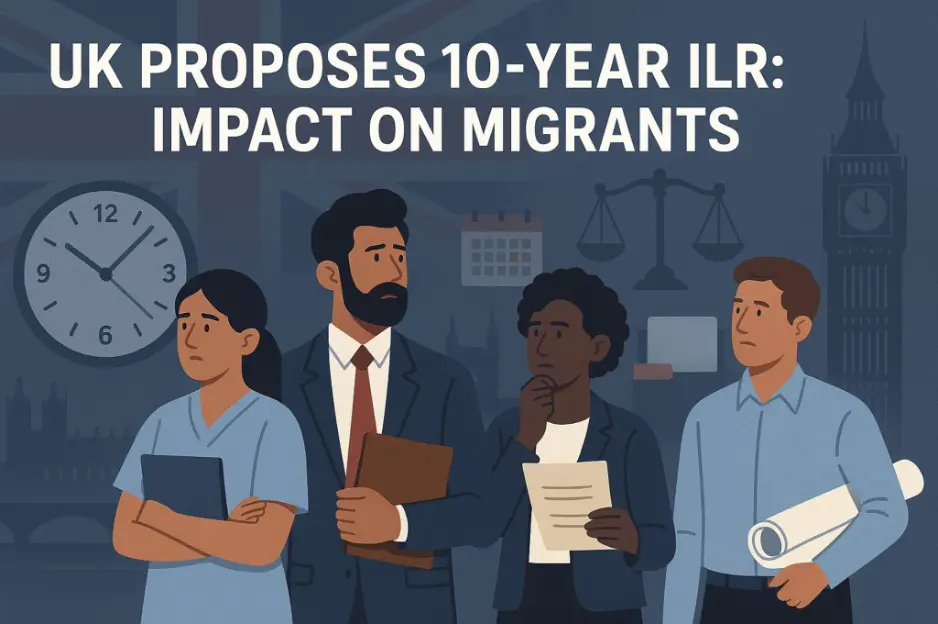In September 2025, the UK Home Office launched an unprecedented campaign, directly contacting approximately 130,000 international students and their families to warn them of deportation if they remain in the country after their student visas expire. This move, driven by a surge in asylum applications from students—15,000 annually, according to Home Secretary Yvette Cooper—signals a tougher stance on immigration enforcement. The initiative reflects broader efforts to address visa overstays and curb what the government calls the “misuse” of the asylum system. For international students, navigating the UK’s immigration policies, cultural landscape, and personal aspirations is a complex journey filled with challenges and opportunities. This article explores the visa process, the hurdles students face, inspiring success stories, cultural adaptation strategies, and essential legal guidance, weaving in personal experiences to illuminate the human side of immigration.
The UK’s Immigration Policy Shift
The UK’s immigration system has undergone significant changes under the Labour government, elected in July 2024, with a focus on reducing net migration and tightening visa compliance. The Home Office’s direct messaging campaign, launched in September 2025, marks a first in proactively warning students via text and email to leave by their visa expiry date or face removal. This initiative responds to a tripling of asylum claims from legal entrants between June 2022 and June 2025, with students accounting for 40% of 41,400 claims from legal routes. Home Secretary Cooper described the trend as “alarming,” noting that many claims are filed when “nothing has changed in home country,” suggesting an attempt to extend stays beyond visa terms.
(The campaign’s message is stark: “If you have no legal right to remain in the UK, you must leave. If you don’t, we will remove you.” Students are also warned that asylum claims lacking merit will be swiftly rejected, and support will be denied unless strict destitution criteria are met. This policy aligns with broader legislative changes, including the Nationality and Borders Act 2022, which increased penalties for immigration offenses, though the maximum penalty for overstaying remains six months’ imprisonment under the Immigration Act 1971.
(Understanding the Student Visa Framework
The UK Student Visa, formerly the Tier 4 (General) visa, is granted based on the duration of an academic course, as outlined in the Confirmation of Acceptance for Studies (CAS) issued by universities. For degree-level courses, visas typically include a wrap-up period of four months post-course for programs longer than 12 months, or two months for shorter courses. Students must leave the UK by the visa expiry date unless they apply for an extension or switch to another visa category, such as the Graduate Route visa, which allows a two-year stay (three years for PhD graduates) to work or seek employment.
(Key requirements for a Student Visa include:
1. A valid CAS from a licensed sponsor institution.
2. Proof of financial stability (e.g., £1,334/month for living costs in London, £1,023 elsewhere).
3. English language proficiency at B2 level for degree courses.
4. For master’s or PhD programs, an Academic Technology Approval Scheme (ATAS) certificate may be required for specific subjects.
(Students must apply for extensions within three months of their new course start date and before their current visa expires, with the new course beginning within 28 days of the expiry. Applications cost £524, and decisions typically take eight weeks, though faster processing is available for an additional fee. Importantly, there is no grace period after visa expiry; remaining in the UK without valid permission results in overstayer status, a criminal offense under Section 24 of the Immigration Act 1971, carrying penalties like fines, up to six months’ imprisonment, or re-entry bans of one to ten years.
(Challenges of Navigating the System
The UK’s stringent visa rules create significant hurdles for international students, particularly those from countries like India, Nigeria, and China, which contribute the largest share of the UK’s 600,000+ international student population. Overstaying risks are heightened by the lack of a grace period, and students who complete their courses early face visa curtailment if the university reports early completion to the Home Office. This can shorten the visa to the standard wrap-up period, leaving students with limited time to plan their next steps. For instance, if a master’s student finishes four months early, their visa may be curtailed to four months post-completion, requiring swift action to extend or leave.
(Language and cultural barriers also pose challenges. Many students struggle with the transition to British academic and social environments, where proficiency in English and understanding local customs are critical. “I felt lost in my first semester,” says Priya, a 24-year-old Indian student pursuing a master’s in data science at the University of Manchester. “The accent, the pace of lectures, and even casual pub conversations were overwhelming. I had to take extra language classes to keep up.” Priya’s experience reflects a common struggle: adapting to a new cultural context while meeting visa conditions, such as maintaining full-time study and complying with work restrictions (20 hours/week during term time for degree students).
(Financial pressures are another hurdle. The cost of living, particularly in London, can strain students’ budgets, with some resorting to unauthorized work to make ends meet, risking visa breaches. In 2024, the Home Office reported that 16,000 students filed asylum claims, often citing financial destitution or fear of returning to unstable home countries. However, the government’s new campaign warns that such claims will face strict scrutiny, leaving students vulnerable to rejection and deportation.
(Overcoming Obstacles: Practical Tips
Navigating these challenges requires proactive planning. Key strategies include:
1. Monitor visa expiry: Check your Biometric Residence Permit (BRP) or eVisa for the exact expiry date. Update contact details with UK Visas and Immigration (UKVI) to receive curtailment notices.
(2. Seek university support: Most UK universities, like the University of Dundee or Oxford, offer International Student Advisory Services with free visa workshops and guidance.
(3. Plan finances early: Budget for living costs and explore scholarships, such as Chevening or Commonwealth, to ease financial strain.
4. Engage with communities: Join student unions or cultural groups, like the National Indian Students and Alumni Union (NISAU), for peer support and integration advice.
(For students facing visa curtailment or rejection, consulting immigration lawyers, such as those at IAS or Gulbenkian Andonian Solicitors, can provide tailored advice. If overstaying is unavoidable due to emergencies (e.g., hospitalization), students have 14 days post-expiry to apply for a new visa with proof of “good reason.”
(Success Stories: Building a New Life
Despite the challenges, many international students thrive in the UK, contributing to its academic, cultural, and economic landscape. Take the story of Chinedu, a 29-year-old Nigerian graduate who completed an MBA at the University of Edinburgh. After securing a Graduate Route visa in 2024, he landed a marketing role at a London-based tech firm. “The visa gave me two years to prove myself,” Chinedu says. “I networked at university career fairs, polished my CV, and learned to pitch my skills in a British way—clear and concise.” His success highlights the Graduate Route’s value, allowing students to work in any field, including self-employment, except as professional sportspersons.
(Similarly, Anjali, a 26-year-old Indian student, transitioned from a master’s in environmental science at UCL to a Skilled Worker visa after securing a job with an environmental consultancy. “The process was daunting—sponsorship, certificates, deadlines—but my university’s career office helped me prepare,” she shares. Anjali’s story underscores the importance of leveraging university resources and building professional networks early. In 2024, over 50,000 students switched to Graduate or Skilled Worker visas, reflecting the UK’s appeal as a hub for global talent.
(“The UK gave me opportunities I couldn’t dream of back home,” Chinedu says. “But it’s not easy—you have to plan every step, from visas to job applications, and stay resilient.”
Cultural Integration: Embracing British Life
Cultural adaptation is a critical aspect of the immigrant experience, particularly for students navigating the UK’s diverse yet distinct social norms. The UK’s multicultural cities, like London and Manchester, offer vibrant communities where students can find familiarity—Indian restaurants, Nigerian cultural festivals, or Chinese student societies. However, rural campuses or smaller towns can feel isolating. “In Durham, I was one of the few Black students,” says Temi, a 22-year-old Nigerian undergraduate. “People were friendly, but I had to explain my culture constantly. Joining the African Society helped me find my place.”
Tips for cultural integration include:
1. Learn British etiquette: Understand norms like queuing, punctuality, and reserved politeness to build rapport with locals.
2. Join campus groups: Universities like Greenwich and Westminster host cultural societies and integration workshops to foster belonging.
(3. Engage in local traditions: Participate in events like Bonfire Night or local charity runs to connect with the community.
4. Improve language skills: Free English courses, such as those offered by the British Council, can boost confidence in social and academic settings.
Integration also involves understanding the UK’s academic culture, which emphasizes independent learning and critical thinking. “In India, I was used to rote learning,” says Priya. “Here, professors expected me to challenge ideas and debate. It was scary but empowering.” Universities often provide academic skills workshops to ease this transition, helping students adapt to new pedagogical approaches.
Legal Guidance: Staying Compliant
Staying within UK immigration rules is paramount to avoid overstaying and its consequences. The Home Office’s strict monitoring—through border checks, employer reports, and immigration databases—makes compliance essential. Overstaying can lead to re-entry bans, with durations depending on the length of overstay and whether departure is voluntary. Leaving within 30 days of visa expiry at personal expense avoids bans, but overstaying beyond this risks one- to ten-year bans and impacts future applications.
(Steps to remain compliant:
1. Apply early for extensions: Submit applications three months before visa expiry, ensuring all documents (CAS, financial proof, etc.) are complete.
(2. Understand visa conditions: Students cannot engage in business or self-employment (except on Graduate Route visas) or take permanent jobs. Breaching these conditions risks visa cancellation.
(3. Prepare for travel: When re-entering the UK, carry evidence like a CAS, flight tickets, or graduation invites to satisfy Border Force officers of your intentions.
(4. Seek legal advice: If facing visa issues, contact organizations like Citizens Advice or IAS for expert support.
(For students planning to attend graduation ceremonies post-visa expiry, a Standard Visitor visa or Electronic Travel Authorisation (ETA) is required, applied for outside the UK. Non-visa nationals can request Visitor permission at the border, but entry is at the discretion of Border Force officials.
(Looking Ahead: Balancing Enforcement and Opportunity
The UK’s crackdown on overstaying students reflects a broader push to control migration, driven by public pressure and the rise of parties like Reform UK, which advocate stricter policies. Home Secretary Cooper’s reforms aim to “fix a broken asylum system,” but critics, including the National Indian Students and Alumni Union (NISAU), argue that most students comply with visa rules and enrich the UK’s economy and society. In 2024, international students contributed £41.9 billion to the UK economy, underscoring their value.
(For students like Priya, Chinedu, and Temi, the UK offers unparalleled opportunities but demands vigilance. “I love studying here, but the visa rules keep me on edge,” Priya admits. “I check my expiry date every month.” Their stories highlight the resilience required to navigate a system that is both welcoming and rigid. As the Home Office ramps up enforcement, students must stay informed, seek support, and plan strategically to build their futures.
The UK remains a top destination for international students, with its world-class universities and diverse culture. Yet, the message is clear: compliance is non-negotiable. By understanding visa rules, embracing cultural integration, and leveraging support systems, students can turn challenges into opportunities, creating lasting legacies in the UK and beyond.














0 Comments